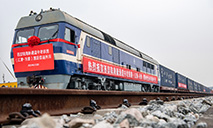Inhumane U.S. sanctions hinder Iranians' access to medical devices
TEHRAN, March 8 (Xinhua) -- "A large number of medical devices and equipment that were easily accessible in the past ... are now very difficult to obtain," Iranian vascular surgeon Ali said, blaming the inhumane broad-based sanctions imposed by the United States for the worsening situation.
Ali, who only gave his first name like other interviewees in the story, said the shortage of medical supplies, particularly those with no domestic substitutes in Iran, such as surgical sutures, staplers, angiography devices and stents, has created numerous problems for Iranian patients.
The United States, under former President Donald Trump, withdrew from the 2015 nuclear deal in 2018 and reimposed sweeping sanctions on the Islamic republic, hampering Iran's importing medical supplies which also include many medicines and even life-saving devices.
"Everything in the Iranian health sector has been adversely impacted by the sanctions," said Maryam, an operating room supervisor at a hospital in Tehran.
Maryam said that another problem is that when a medical device breaks down, repairing it will be very costly and sometimes even impossible because the spare parts have to be imported from abroad.
"This was in contrast to the fact that, prior to the sanctions, foreign companies operating in Iran would provide warranty and after-sales services for their products," she recalled.
Yet, in the aftermath of the U.S. reinstatement of the sanctions, many foreign companies fled Iran in fear of Washington's penalties, thus canceling any after-sales services.
But Maryam noted that the U.S. sanctions have prompted a number of Iranian companies to begin manufacturing the needed devices through reverse engineering, leading to a rise in domestic production.
Ahmad, a biomedical engineer and an importer and manufacturer of medical items, blasted the broad-based U.S. sanctions for hindering the transfer of modern technologies to Iran, widening the already existing gap between Iran and the rest of the world.
For example, Iran is unable to import advanced surgical microscopes that improve the navigation and detection of tumors or some diseases, just because such devices are banned by the U.S. from exporting to Iran as they contain the technology that may be utilized in military systems.
Due to similar reasons, the U.S. sanctions prevented Iran from importing many other medical devices equipped with modern technologies in general, Ahmad added.
However, Ahmad expressed optimism that the U.S. sanctions would be lifted soon, as Iran and the major parties to the 2015 nuclear pact are approaching an agreement to revive the deal at the talks held in the Austrian capital of Vienna.
Once the sanctions are lifted, Ahmad said, Iran could revive the import of advanced medical advices and advance its domestically developed technologies in the medical field.
"I will not lose hope for a better future," he added.
Photos
Related Stories
- 9.5 pct of delivered COVID-19 vaccines wasted in U.S.: media
- New Omicron subvariant infections double each week in U.S., fueling concerns
- One dead, two in critical condition after shooting outside U.S. high school
- U.S. should address internal vulnerabilities rather than overstate external challenges: report
- Iran holds 1st national Wushu festival
Copyright © 2022 People's Daily Online. All Rights Reserved.










